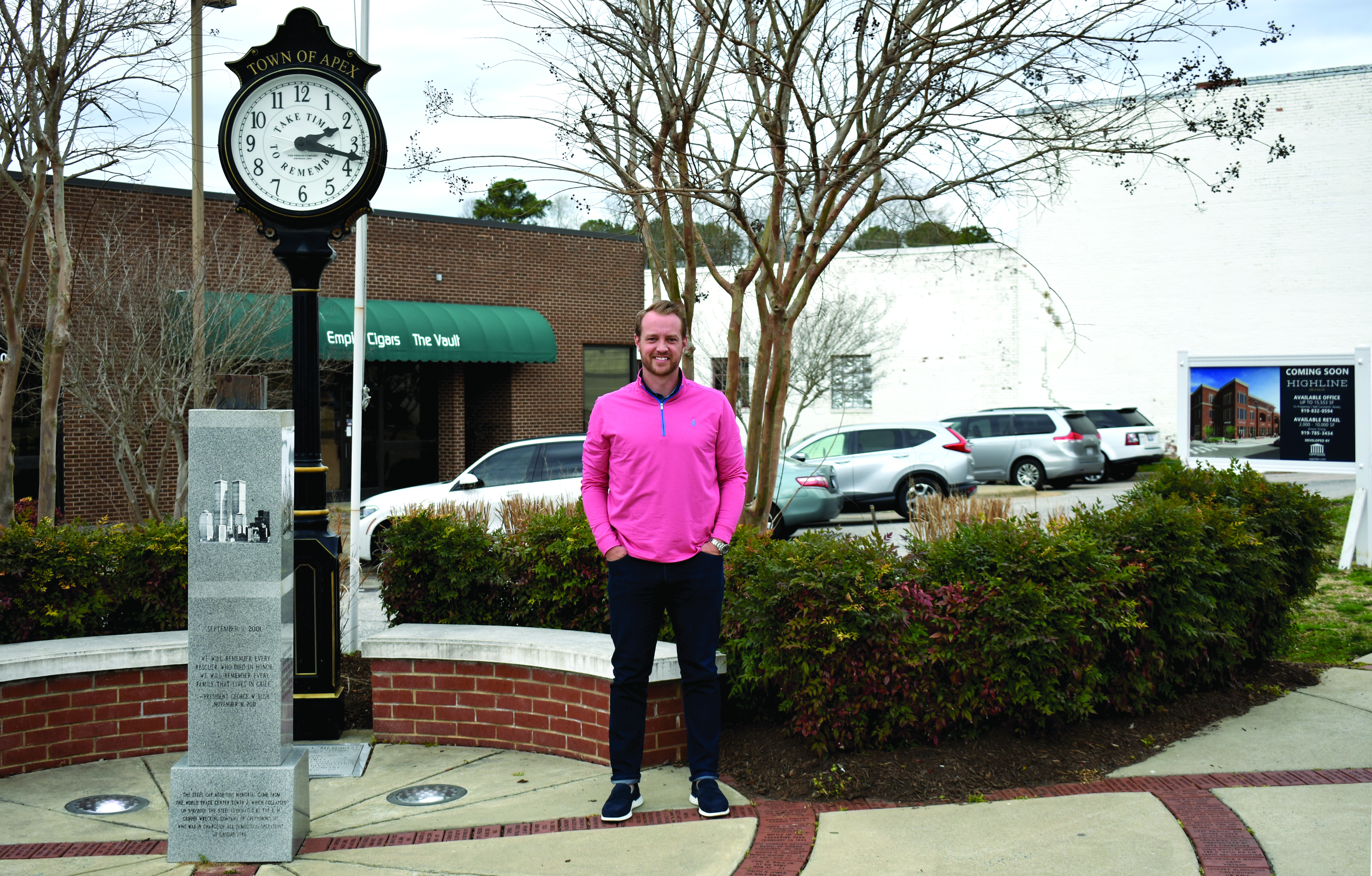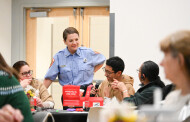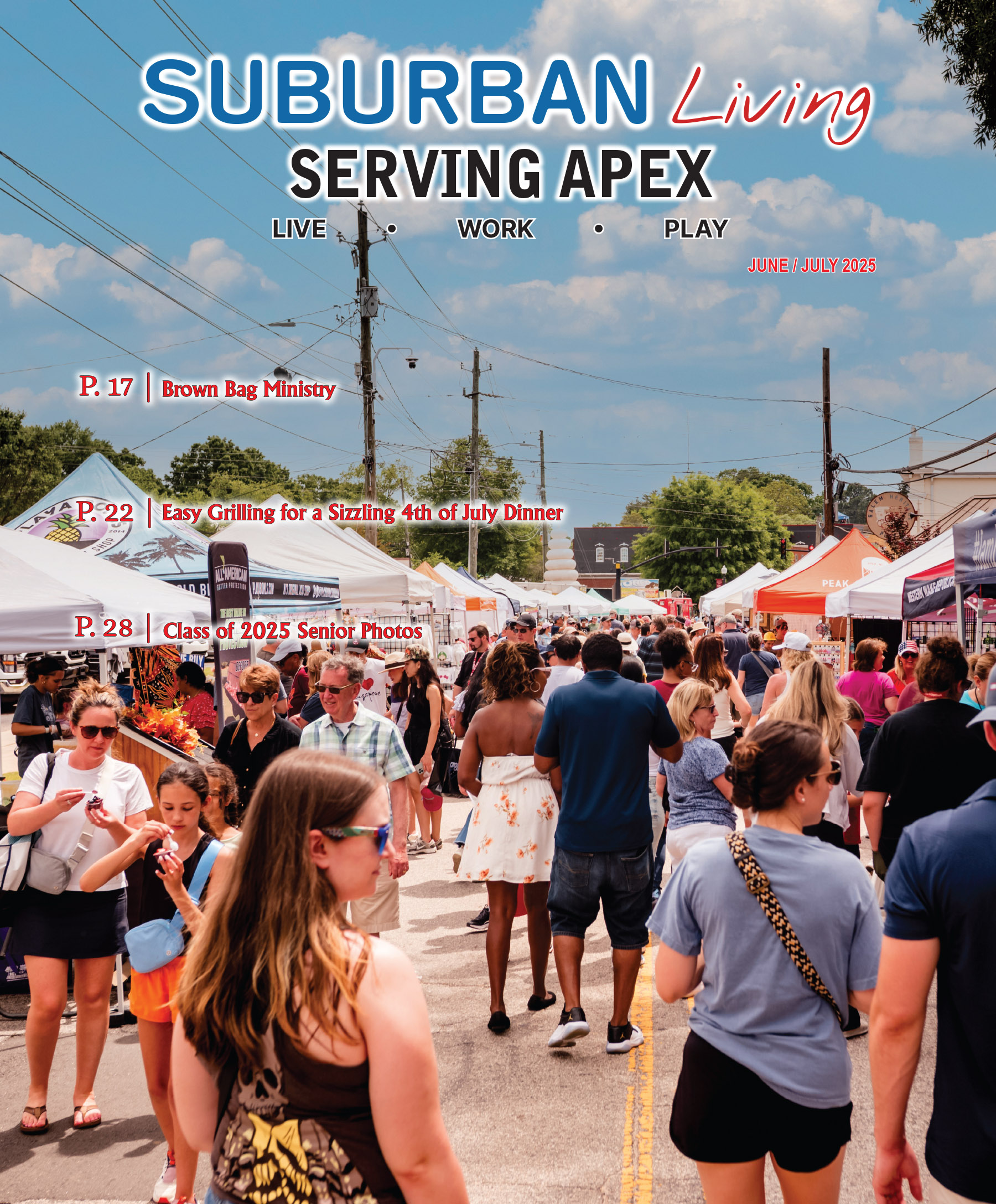Tim Brent is a former hockey player in the NHL, and current resident in Apex. We sat down with Tim to learn more about how he ended up in the NHL, and more importantly, how he ended up in Apex. Tim lives in Apex with his wife Eva and two children, and is already making an impact in Apex. We’re excited about having Tim in the magazine, and in Apex!
SL: Where did you grow up?
Tim: I was born in a small town called Hespeler, about an hour and a half west of Toronto, ON.
SL: How old were you when you started playing hockey?
Tim: I started skating when I was about 18 months old, and played my first year of hockey when I was four. I immediately fell in love with the game, and I was probably about eight or nine years old when I decided that was what I wanted to do. I think a lot of kids think the same way and I made a conscious decision early on in my life that I was going to give myself every opportunity to play hockey in the NHL.
SL: That’s an early start. How have your knees held up?
Tim: Knees are fine. Shoulders are a different story. I had shoulder surgery six weeks ago from an old injury, and had the other shoulder done about 15 years ago. There’s been a myriad of broken bones and other injuries.
SL: It’s not quite the same as ballet, for example.
Tim: No, it’s not. My nose, face and hands will certainly prove that to be the case.
SL: So, when did you retire from hockey?
Tim: 2016 was my last year, and understanding that I wanted to get into the real estate business as my next career, when I was here playing for the Hurricanes, I became friends with, and actually bought some real estate from, a local real estate guy named Steve Stroud. Steve and I are still great friends.
In 2016, I had a deal to go play in Sweden for another two years and had planned on doing that. I called Steve and asked if I could come shadow him and some of the brokers that were at the NAI Carolantic office to understand what they did. At the end of my week of following him around, he sat me down and said, “I’m not going to be able to do this a whole lot longer. I would love to mentor you, but you’re going to have to give hockey up, because I don’t know if I’ll still be around if you play for another two or three years.” It was really one of those “now or never” deals, so I had to talk it over with my wife.
We were living in Florida at the time. She’s originally from British Columbia and I’m from Ontario. I didn’t want to move all the way out west, and she didn’t want to move to where I grew up, so we picked neutral territory which was here in North Carolina, because we both fell in love with the state and the people in the state. [I was playing for Russia], and we had bought a place down in Florida because of the Russian hockey season. It started earlier and ended earlier, and if you didn’t go deep in the playoffs, you could be stuck in Canada in February which is no fun. We wanted a place to have a good offseason, so we ended up in Southwest Florida.
My wife Eva had come up to look around because we hadn’t spent a lot of time together in the Raleigh area. We had been married for just over a year at that point. We were [talking] in the Starbucks parking lot in Briar Creek, and decided that I was going to retire from hockey and take up a new career in real estate. We also decided that we were going to move to North Carolina, and not more than 15 minutes later, our doctor called and gave us the great news that Eva was pregnant with our first child. To say that we sort of jumped off the cliff together at that point was an understatement. We had a lot of major life changes happen in the span of about 15 minutes.
SL: When you were playing for Carolina, where did you stay?
Tim: I lived in North Hills. Most of the guys did at the time. I wasn’t married so I didn’t have a family where I needed a house. I was on a two-year deal, so it’s not like I was committed to buying a place here at that point, although now I look back and wish I did.
SL: So you met Eva around the time you were retiring?
Tim: Eva and I met my last year here, when I was playing for the Hurricanes. We ended up dating, and then getting engaged while I was over playing for Russia. I left the Hurricanes and beautiful North Carolina to end up in Russia for two years. It was an awesome life experience, but a much different place to live.
I played in Philly’s minor league system in Lehigh Valley my last year in 2016, and then retired.
SL: Tell me a little more about Eva. Her father has a show on the Outdoor Channel, right?
Tim: Her dad has had multiple shows on the Outdoor Channel over the last 20 years or so. After college, Eva decided to join her dad for a lot of different reasons. One being access to wild game, which was the meat she grew up eating until she moved away, and realized that a lot people just go buy their meat at the grocery store, which she didn’t really think about until she left home. She got into the family business after that and co-hosted her dad’s hunting show, and quickly became one of the more influential faces of women in the outdoor industry. Women have been the highest growing demographic in the hunting industry and many have discovered the outdoor/organic lifestyle that hunting coincides with and Eva and a few other strong women have led the effort in that growth. She’s made a great career of representing some of the best outdoor brands in the world, and now many lifestyle brands outside of the hunting industry as well, specifically through her incredible social media following. We’re pretty normal people, but she gets to share our family with her followers, and I think a lot of people can relate to what we do on a regular basis. ( You can see more about Eva at
https://evashockey.com)
SL: Is it fair to assume that Eva is a bit of a unicorn in the hunting industry?
Tim: Unfortunately, with the hunting industry, there’s a lot of stereotypes, and a ton of criticism. Eva certainly breaks the mold on the stereotypes of what I think the majority of the US population pictures as a hunter. I’m a huge outdoorsman myself. I love to hunt and fish and truly part of the reason that we fell in love with North Carolina so much is the outdoor activities, and access to the outdoors here, that it seems so many families enjoy. Being so close to the coast, lakes and the mountains, it really fits in with the things we enjoy.
SL: Did you hunt before connecting with Eva and your father-in-law?
Tim: I did. I grew up fishing a lot, and it was a natural progression to move into hunting as a teenager with some buddies of mine. It started with birds, and I started big-game hunting by the time I was 19 or 20. Specifically bow hunting, which is how I spend a lot of time in the woods now – with a bow in my hand. I’ve just really fallen in love with that kind of hunting. There are so many aspects of that lifestyle that we just can’t get enough of.
SL: So how did you decide on Apex?
Tim: As you can imagine, as life changed, and I was no longer a nomad suitcase hockey player, when I got an opportunity to put roots down, Eva and I both wanted some property, and to live with a little bit of elbow room. We wanted our children to have the ability to play in the woods, and run around outside and get dirty. Do all the things that kids should do. I was able to find about 15 acres in Apex. Being in the real estate industry and understanding controlled access with Highway 1, and the ease of getting in and out of Raleigh, the southwest corridor seemed to be the right place to go. Low and behold, you get to downtown Apex, and it reminds me of my hometown where I grew up. Nostalgia kicks in, and we quickly realized that Apex was where we wanted to be. It all came together. We were able to buy some land and put a home on it. We’ve been living in the home we built for about a year and a half, and we just love it.
SL: Let’s talk about this project that you have going on downtown, and any other current plans that you’re working on.
Tim: The company that I’m working for now is Oppidan. Oppidan is Latin for “townsman” and we take that to mean town and community. For Eva and me, our goal is to make an impact on where we live. We saw an opportunity in downtown to deliver a property and product that will not only fit in, but will also add to a wonderful downtown feel, and fill in a gap in a retail corridor that has sat empty for a couple of years. Then, to be able to add office space for Oppidan to grow in downtown Apex, where I hope to be working from a year from now, is special. We’re excited about adding more retail opportunities to downtown, as well as some office space and jobs in the downtown district of Apex. We’re excited that we’re kicking off our first mixed-use project in the Triangle, and we’re doing it right here in Apex. The company headquarters is in a suburb of Minneapolis called Excelsior, MN. It’s a small town similar to Apex.
We’re also working on a big project off of Ten Ten Road in Apex. It’s about a 120-acre site where we’ll be putting some industrial-style buildings on the ground. Right now, we have four buildings laid out, which cumulatively would be about 600,000 square feet. The buildings are 150,000 square feet, expandable to 200,000 square feet. We’re planning on building a 40-foot clear building with mezzanine office space, and truly use the square footage of the building. It’s a really exciting project from an economic standpoint. We’re excited to see what that will do with job creation and tax base, and overall impact on the community as a whole.
I think this southwest corridor has an immense amount of talent, and it’s such a great area to live in, that from a company standpoint, when they’re considering places in the country to set up, we have a lot to offer here.
SL: What’s the timeline for ground breaking?
Tim: Our hope is to break ground in the fall of this year, and deliver a building in early 2022. The downtown Apex project should be breaking ground within the next 30 days, with a delivery of January 2022.
SL: Is there anything that I haven’t asked you about that you’d like to share?
Tim: I don’t think so. The thing I’d like to get across the most is that I’m very grateful to have been able to play hockey for as long as I did, and more grateful to have a loving wife and two great kids, and have them grow up in Apex. I think it’s a blessing for all of us to be able to grow up in a community like this one. I got to do it as a kid, and I think it molded me as a person, and I’m thankful that they’re going to be able to grow up like that, too. To be able to find a place where you can find 15 acres, but still be only seven minutes from Target, (which was a criteria for my wife), it’s hard to find.








